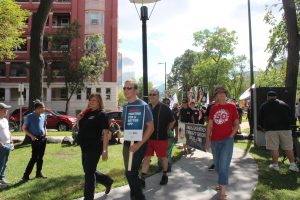CBC News – Kristin Annable
Manitoba’s public sector unions were working double-time Monday evening to stop the passing of two bills that will make sweeping changes to collective bargaining under the Pallister government.
Dozens of delegates lined up at two separate committee hearing rooms at the legislature to have their final say to government on two contentious labour bills before they become law in the coming months.
Union representatives ranging from Doctors Manitoba and the Manitoba Nurses Union to the Manitoba Teachers’ Society spoke out against Bill 28, which effectively takes wages off the bargaining table and institutes a two-year wage freeze for all future collective bargaining agreements.
Across the hall at another room, more gathered to speak out against Bill 29, which seeks to chop the number of bargaining units in the health sector from 183 to seven.
Representatives such as Manitoba Nurses Union president Sandi Mowat played double duty, speaking at both hearings. The contract for Manitoba’s 12,000 nurses expired in March, making it one of the first collective agreements to test the bill that will mandate two years of freezes, followed by a 0.75 per cent raise in the third year, and one per cent in the fourth.
“It infringes on our right to bargain,” said Mowat of Bill 28. “We are concerned that this bill actually infringes on our charter rights to bargain collectively.”
Mowat wouldn’t confirm that a legal challenge is in the works if the bill becomes law, but said her union is looking into the idea.
Manitoba Teachers’ Society president Norm Gould called the bill “Draconian” and said it contradicted promises made by Premier Brian Pallister that he would consult with unions before passing such legislation.
“Our hope is that they will come to their senses and allow us to go to the bargaining table and work this out,” Gould said. “It is not a public sector deficit, so to put it only on the shoulders of the public sector is improper and inappropriate.”
Today’s debt is tomorrow’s tax increase: CFIB
The committee hearings allow for private citizens to speak to government officials in a public forum and offer suggestions for amendments before the bills reach third reading and then become law.
Over 30 delegates were scheduled to speak at both meetings, with Finance Minister Cameron Friesen speaking for government at the Bill 28 hearings and Health Minister Kelvin Goertzen at the head of the Bill 29 hearings.
While the vast majority were speaking in opposition to the bills, the government had a cheerleader in the Canadian Federation of Independent Business. Its director of provincial affairs, Jonathan Alward, presented in favour of the bill, saying all Manitobans are bearing the brunt of a massive deficit and something has to give.
“Today’s deficits, today’s growing debt, are going to translate to tomorrow’s tax increases,” he said.
“At the end of day, private sector companies have difficult decisions to make … the government is in that position right now,” Alward told CBC News. “They (the unions) are only showing one side of the story … this type of a wage freeze is a difficult, but necessary decision.”
‘We must do our best’: Pallister
The government has been firm on its stance that both bills are necessary to get the government’s fiscal house in order. When asked about the bills in question period by the Opposition NDP, Pallister reiterated that his government inherited a “fiscal challenge.”
“We must do our very best” to fix that, Pallister said Monday.
Pallister has previously said a one per cent increase in public sector salaries costs the government $100 million.
As for limiting collective bargaining units, Goertzen told CBC News last week that the measure will bring Manitoba in line with the rest of Canada.
He said British Columbia has five collective bargaining units. In Saskatchewan there are 14. Bill 29 would drop the number in Manitoba to seven from the current 183.
“There is so many different bargaining units, which means there is so many different labour agreements, which means every time somebody is trying to schedule somebody … or ensure there is proper coverage in a hospital or on a ward, we have to check to make sure that the individual collective agreement allows somebody to do it,” Goertzen told CBC News.
The bill also would lead to the appointment of commissioner who could supercede rulings by the Manitoba Labour Board and would not be accountable to legal challenges.
Unions will have to wait and see
Mowat said she didn’t understand the need for the bargaining unit bill, explaining that most of the units in the health care system bargain together. She also said it would also further disrupt a health-care system that is already in the midst of a major revamp with the closing of three emergency departments in Winnipeg.
“To get all these health-care unions to have to have runoff votes is not something we need right now when the health-care system is already pretty disrupted,” she said.
She described it as “interesting” that the government would appoint a commissioner.
“We will have to wait and see what the regulations say at the end of this,” she said of the appointment.









